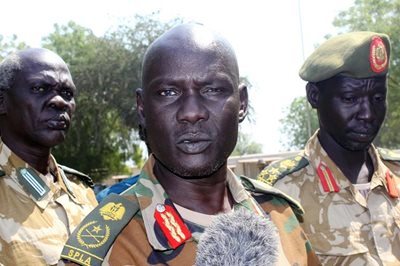S. Sudan army accuses unnamed foreign force of aiding rebels
February 17, 2014 (JUBA) – The South Sudanese army (SPLA) loyal to the Juba administration has accused external forces of providing support to armed groups allied to former vice-president Riek Machar, claiming they had found military parachutes and weapons after capturing Gadiang; a rebel stronghold in Jonglei state.

Lt. General Malual Ayom Dor, who heads military operations in Jonglei, said troops under his command found a significant weapons stash after capturing Gadiang following clashes with rebel forces in the area.
“As you can see, this is the place from where the rebel of Riek Machar used to launch attacks on the civilian settlements. It was from here where they attacked Mathiang and Kolnyang, killing innocent civilians. They refused to observe and respect the terms of the cessation of hostilities. So our forces fought them back in self-defence until we managed to push them away and take control of this place”, Dor said in statement on South Sudan Television (SSTV) on Sunday.
“Now you see the rebel [forces have] fled and left everything. As you see, there are a lot of weapons which have been captured. You see there are parachutes which were used to drop weapons and other military supplies. This is an indication that some foreign forces provide support to this group”, the statement adds, without providng further detail on the origin of the foreign forces.
Both sides have repeatedly traded tit-for-tat accusations of violating the cessation of hostilities agreement signed on 23 January in the Ethiopian capital, Addis Ababa, where the second round of talks are currently underway.
Discussions continue to make little headway despite mounting pressure on the warring parties to resolve their issues.
PEACE TALKS STALL
Rebel officials say talks remain deadlocked because the government has failed to implement the agreement on the status of political detainees without whom they cannot go ahead.
Many have expressed fears that any delay to reach a comprehensive settlement would encourage armed confrontation and subsequently deny relief organisations access to displaced people in conflict-affected areas.
Some 738,000 people are internally displaced, while a further 135,000 have fled across the border to neighbouring countries since violence broke out in the capital Juba on 15 December following clashes between rival members within the presidential guards.
The number of dead and wounded is estimated to be in the tens of thousands and the ceasefire agreement has not yet been implemented and remains shaky.
Many aid agencies have warned that there remains an urgent need for food, clean drinking water, health care, shelter, sanitation, hygiene and protection that exceeds the current humanitarian capacity.
(ST)
